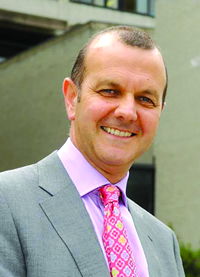For nearly 30 years, researchers have studied how to manipulate antibody genes to develop targeted therapeutic agents that are now being used to treat a range of autoimmune and inflammatory rheumatic diseases. With regulatory agencies now supporting the development of biosimilar therapeutic agents, another chapter of antibody-based therapeutics is about to begin.
The basic science symposium Immunology Update: Biologic Agents: From Nature to Protein Engineering to Biosimilars will shed light on some of the questions related to this burgeoning area of research. It will take place from from 7:30 – 8:30 am Tuesday in Salon G.

For the past 20 years, investigator John D. Isaacs, MD, PhD, FRCP, Professor of Clinical Rheumatology at Newcastle University, Newcastle upon Tyne, United Kingdom, has focused his work on the potential of novel immunotherapies to treat rheumatoid arthritis — ranging from target identification to early and late-stage clinical trials.
Dr. Isaacs directs Newcastle University’s Translational Medicine Institute, the Institute for Cellular Medicine, and runs a research group focused on therapeutic tolerance induction, including the development of novel tolerogenic therapies, and biomarkers of early arthritis. He has published more than 200 peer-reviewed manuscripts and in 1999 received the British Society for Rheumatology Michael Mason Medal.
“The central goal of my lecture is to explain the molecular features of antibodies and to show how protein engineering has led to our current armamentarium of antibody-based therapeutic agents,” he said.
During his presentation, Dr. Isaacs will provide an overview of immunoglobulin gene structure, discuss how recombinant antibody technology has changed the treatment of autoimmune rheumatic diseases, and review the latest generation of biologic drugs. He plans on reviewing recent findings with potential clinical implications, such as the development of bi-specific therapeutics that should be of particular interest to attendees.
“I’ll discuss the recent entry of bispecific antibodies into clinical trials. These agents should provide a novel angle on the treatment of certain rheumatic diseases,” he said.
Dr. Isaacs, who has performed several pioneering experimental medicine studies in patients with inflammatory disease, will also describe different molecular species — all developed with an understanding of antibody structure-function relationships — and will touch on “glycoengineering” in terms of novel antibody development.
He also will discuss how new agents will continue to evolve into the future.
“Some attendees may be surprised to know that branded biologic drugs change throughout the years,” Dr. Isaacs said. “The branded antibody therapeutics that clinicians administer today may not be identical to the ones they administered several years ago. In fact, attendees may not be aware that a vial of a biologic drug is not homogeneous and contains multiple molecular species.
“The power of molecular engineering is such that rheumatologists will continue to see highly novel kinds of targeted therapies, which combine the optimal attributes that nature has provided us with,” he said.
Dr. Isaacs will conclude by providing attendees with an overview of the challenges posed when researchers seek to develop and approve a biosimilar therapeutic agent.
BASIC SCIENCE TRACK
Immunology Update: Biologic Agents: From Nature to Protein Engineering to Biosimilars
7:30 – 8:30 am Tuesday • Salon G
